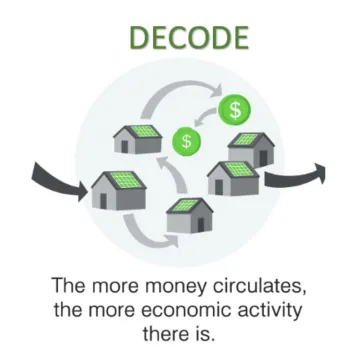DECODE
Decentralized Energy Communities with a Digital Economy

© DECODE
- Category
- Project
- Call
- DUT Call 2024
- Duration
- –
- Project coordinator
- Norwegian University of Science and Technology
DECODE addresses the urgent challenge of making decentralized energy systems not only technologically viable but also economically and socially inclusive. While tech innovations such as IoT smart meters and decentralized renewables are rapidly advancing, they often evolve in silos: disconnected from local governance and the broader political economy of finance. A key constraint is the persistence of centralized monetary systems, which concentrate wealth and decision-making in financial hubs. As a result, peripheral municipalities experience capital outflows: value generated locally is siphoned elsewhere rather than reinvested locally. This dynamic undermines the viability of energy communities by limiting their ability to recirculate value and sustain long-term, citizen-led transitions. DECODE’s central research question asks: How can tokenized local monetary systems be designed to align energy behaviors with circular and regenerative practices? Through the co-development of digital, purpose-specific local currencies, the project explores how socio-environmental values can be structurally embedded in community-scale financial systems and Positive Energy Districts.
DECODE is piloting Energy-Token Communities (ETCs) that integrate decentralized renewable energy with local, purpose-driven currencies. These tokens are designed to quantify and circulate value from community-based sustainability practices, such as peer-to-peer energy trading, flexibility services, urban farming, and waste reduction, embedding socio-environmental contributions into local economies. Token systems will be co-designed with communities using participatory methods, including focus groups, co-design workshops, and governance modeling, to ensure monetary rules reflect local priorities. Activities will be implemented across four demonstrator sites: Ørland (Norway), João Pessoa and Maia (Brazil), Maia (Portugal), and Lund (Sweden). In Phase I, each site will assess feasibility; in Phase II, three will fully implement token economies. The tokens will be programmable and data-integrated to support adaptive governance and simulate policy outcomes. The project aims to build replicable, community-led financial infrastructures that reduce value leakage, enhance economic resilience, and advance energy justice, ensuring that decentralized transitions are not only technically sound but also socially and economically inclusive.
DECODE will deliver practical, community-owned financial tools that strengthen the social, economic, and environmental foundations of decentralized energy transitions. By co-developing Energy-Token Communities across diverse European and Global South sites, the project will demonstrate how local digital currencies can embed renewable energy surplus into everyday economies, linking energy behaviours with regenerative value systems. Benefits include enhanced social cohesion, increased local energy autonomy, and reduced capital leakage from underserved municipalities. Marginalized neighbourhoods will gain capacity to manage local energy initiatives; municipalities will be equipped to anchor energy transitions in inclusive monetary systems. Civil society and small businesses will engage through tokens that reflect shared environmental and social priorities. The project also generates high replicability through open-source infrastructures, co-design methods, and adaptable governance frameworks. In doing so, DECODE offers a scalable pathway toward energy justice, enabling communities to become not just energy producers, but stewards of local economic value, resilience, and climate adaptation.
Austria
Brazil
The Netherlands
Norway
Portugal
Sweden
Hogeschool van Amsterdam, Escola de Administração de Empresas de São Paulo da Fundação Getulio Vargas, Espaço Municipal - Renovação Urbana e Gestão do Património EM, KTH Royal Institute of Technology, Lunds universitet, Municipo da Maia, PackBridge AB, Technische Universität Wien, Ørland kommune
EnAccess, Instituto Voz Popular
Contact
Tatiana Grandon
tatiana.c.g.grandon@ntnu.no